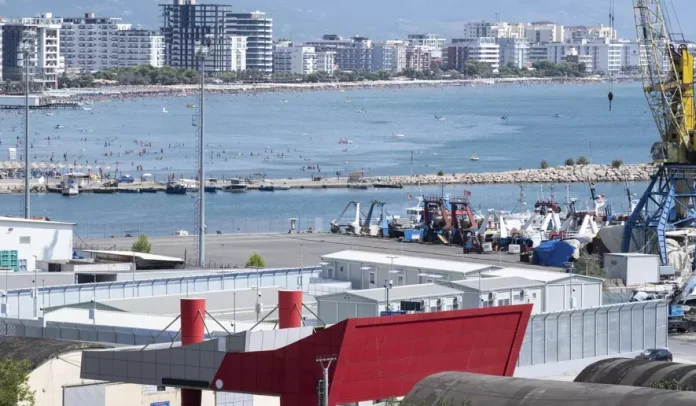Italy and Albania on Thursday missed a deadline to open a controversial camp to hold migrants in the Balkan country before their asylum claims are processed.
The facility is the cornerstone of a highly controversial deal struck between Rome and Albania to sort migrants rescued at sea in Italian waters. Those deemed most vulnerable are to be taken to Italy, while the rest will be sent outside the EU to the Albanian port of Shengjin. There the migrants will be taken to another centre at the former military base in Gjader, where they will wait for their applications to be processed.
Italian Prime Minister Giorgia Meloni promised during a visit to Albania in early June:
The complex of two centres will start operating from August 1.
Despite promises that they would be up and running by Thursday, the reality on the ground has turned out to be quite different. Visiting the Gjader camp this week, AFP found that only a handful of dwellings have been assembled and there is no sign that construction will be completed any time soon.
Italian authorities, who are responsible for building and running the camps, were reluctant to give a new date.
Asylum seekers sent to Gjader will live in small blocks surrounded by high walls until their requests are reviewed by Italian courts. Meloni, leader of the far-right Brothers of Italy party, said the facility would have an initial capacity of about 1,000 people and would gradually be expanded to 3,000.
According to Italian media, about 10 judges will hold hearings via video conference with asylum seekers in Albania. Human rights groups have condemned the project as “illegal” under international law. But the migrants’ imminent arrival is largely seen as a welcome development in this impoverished corner of northern Albania, which ironically has lost much of its population to migration.
Camp as an opportunity
Behind the high fences of the centre, the area around Gjader is largely abandoned and the population has fallen from 7,000 to 2,000 in recent years. Those who remain live mainly from farming and money sent home by Albanians working abroad.
Village head Alexander Preca, 65, sees the camp as an opportunity for Gjader. Preca, whose eldest child will drive the bus bringing migrants from Shengjin to Gjader, said:
The neighbourhood is growing, Albanian and Italian workers are buying goods in our shops, renting our houses.
Many new job adverts have popped up in the village, including vacancies for nurses, cleaners and psychologists. Salaries for high-level positions are around 1,000 euros a month ($1,082), well above the Albanian average.
The visiting Italian ambassador even promised to help solve problems with the local electricity grid, a perennial problem in Gjader. Preka also added:
Since 1973 we’ve had Chinese and Russians (sent as advisers during communist rule)…. I swear on my children’s heads that no one here is racist or against the arrival of these people.
However, the migrants will not mix with locals. Instead, they will be locked behind a fence and guarded by police.
Signing a controversial agreement
Italian and Albanian Prime Ministers Giorgia Meloni and Edi Rama announced the initiative last November. Italy’s parliamentary senate voted in February for an agreement to set up two centres on Albanian territory to receive immigrants seeking to enter Italy.
The measure was meant to help relieve overcrowded Italian migration centres, which now house hundreds of thousands of refugees and migrants, mostly from Africa.
Meloni has long sought the help of European Union countries to tackle mass migration but has not received support from them. “Albania is not just a friend of Italy, Albania is a friend of the European Union,” she said, thanking Edi Rama for his help last year.
